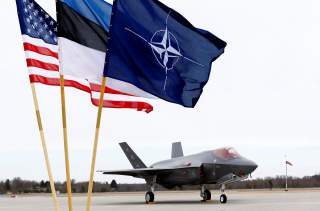The Case for Refashioning NATO
The national-security threats of yesteryear are gone, but the NATO structure remains the same.
However, if there is some as yet undisclosed menace which warrants American involvement in the continent’s defense, then two percent of GDP is far too low. After all, Europe’s economy is equivalent to America’s. Europe’s population is larger. If the Europeans need to be defended against someone, they have the wherewithal to do so. If they don’t believe the threat warrants devoting even a couple pennies on the dollar to defense, why should the United States spend anything on them? NATO was formed to protect war-ravaged states which could not alone deter the battle-tested Red Army from marching to the Atlantic. Today the Europeans have vastly greater economic strength and significantly larger population than Russia. The Europeans even spend much more on their militaries. There’s no reason for Americans to garrison the Baltics, Poland, and more in Europe.
President Trump insisted that NATO has “got to start paying your bills.” But such arguments are divisive without yielding much benefit in military effectiveness. Instead of arguing about money, upon which President Trump appears to fixate, the administration should decide what it is willing to do. First, Washington should turn Europe’s defense over to Europe. Other than being ready to act if something went drastically wrong and the revived Red Army ended up marching down the Champs-Elysees to the Arc de Triomphe, the United States should view European security with benign neglect. Europeans then would make their military decisions based on their own needs, with the knowledge that they could not offload the problem onto America. How much do they worry and how much are they willing to do in response?
Second, Washington should suggest continuing cooperation over shared interests beyond Europe. That could be both geographic (such as the Middle East) or subject matter (cybersecurity and terrorism). The United Kingdom and France are likely to maintain out-of-area foreign interests, while other Europeans less so. However, the United States, too, should be more circumspect in its foreign entanglements. Iraq was a disaster. Libya was foolish and counterproductive. The endless war in Afghanistan is without purpose. American forces should stay out of the Syrian civil war. If Europe and America were not unnecessarily yoked together in alliance, then they would be less likely to drag each other into the other’s favorite senseless wars (e.g., Libya for Europe, Afghanistan for America). Rather, any joint conflicts would have to be important for both sides.
Such a division of responsibilities suggests refashioning NATO. The Europeans could take over the alliance, perhaps with America as an associate member. Or they could turn NATO into something more closely aligned with the European Union, though again offering intermediate status for Washington. The alliance structure would retain the connection between the European and American militaries, encouraging cooperation and coordination. Most important, the United States and various European states could decide on their military outlays based on their own requirements. No longer would Washington attempt to browbeat friendly states into spending more than their populations desired. The more distant relationship could ironically be a smoother and more satisfying one.
NATO needs to change. U.S. ambassador to NATO Kay Bailey Hutchinson said the theme of the upcoming meeting was “strength and unity,” but we should be well beyond such banalities. There is no reason to believe that an alliance created decades ago in the midst of the Cold War is the best form of military organization today. Instead of arguing over spending targets, the allies should discuss defense responsibilities. And then adjust NATO appropriately.
Doug Bandow is a senior fellow at the Cato Institute and former special assistant to President Ronald Reagan. He also is author of Foreign Follies: America’s New Global Empire.
Image: U.S., Estonia's and NATO flags flutter next to the U.S. Air Force F-35A Lightning II fighter in Amari air base, Estonia, April 25, 2017. REUTERS/Ints Kalnins

